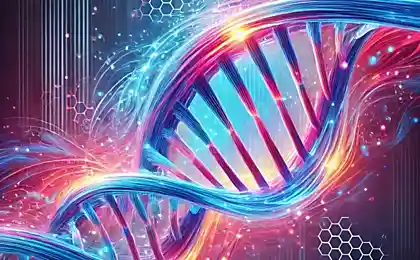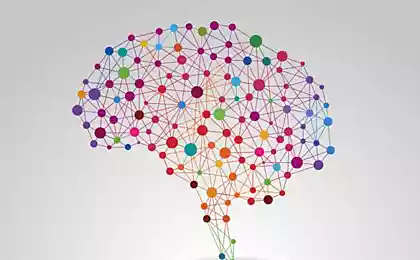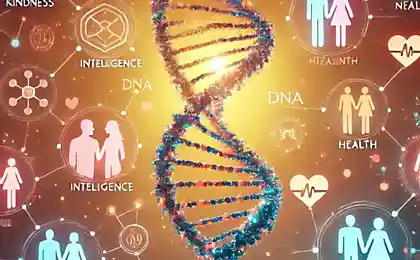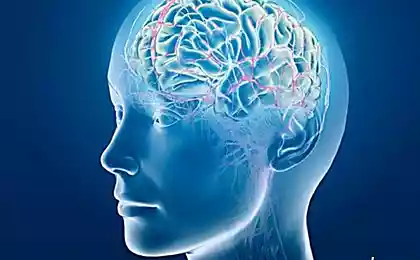696
How genes affect personality, intelligence and mental health
In English literature for the determination of psychogenetic uses the term "behavioural genetics" — "genetics of behavior". Some scientists say that this discipline lies at the intersection of psychology, neurobiology, genetics, and statistics, others view it as a field of psychology that simply uses genetic methods to study the nature and origin of individual differences in humans and animals. The latter definition seems closer to the essence of this scientific direction, as the focus of his attention is the structure and operation of the psyche, and the genetic component, rather, is a factor which affects it.
Ninety one million three hundred seventy six thousand ninety
Psychogenetics of sex: the boy who was raised as a girlDifferences in the behavior of people of different sex is one of the issues dealt with in this area. A textbook example that defined modern ideas of psychogenetic floor, is the case of David Reimer, the boy who was raised as a girl. David, along with twin brother was born in a poor canadian family and an infant survived the accident, which resulted in the lost penis. Ramery could not find a way out of the situation, and then accidentally learned about the theory of John Mani (the Creator of the term "gender"), who was convinced that gender role is determined by upbringing, not DNA. Data, allows you to deny it, at that time did not exist.
The level of development of surgery are not allowed to carry out reconstruction surgery, and David's parents decided on a sex change operation, hoping to raise her son as a daughter. The child was given a new name — Brand. Brenda was toys, clothes and classes for girls, brother treated her like a sister, and parents — as my daughter. However, it soon became clear that both psychologically and outwardly, the girl develops masculina type. Brands have not had relations in school (to peers weren't interested, and the boys didn't want to play with a girl), and in the diary she wrote that she has "nothing to do with the mother." In the end, the girl began to think about suicide, and when my parents decided to tell her the truth. Brand made three failed suicide attempt, after which she decided to become a boy again. She underwent hormone therapy and had surgery on restoration of the primary sexual characteristics.
The theory of Dr. Mani was denied. David paid substantial compensation for their suffering, but his psychological problems were never fully resolved. In adulthood Reimer married and adopted three children, but soon after the death of his brother, who died from an overdose of antidepressants, still committed suicide. At the time he was 38 years old.
Today we know that gender is determined genetically. A man cannot "make" a man or woman at the expense of education, pressure or manipulation: the inherent genetics of the mechanisms is stronger than all of this. That's why people with a diagnosis of "transgender" today assign a sex change operation to bring the biological sex into line with psychological.
Phenylketonuria: attack on neurons
The influence of genetic mechanisms on the functioning of the psyche can manifest itself not only in fundamental issues like gender. Another example is phenylketonuria, a hereditary metabolic disorder of amino acids primarily phenylalanine. This substance is present in proteins of all known living organisms. Normal liver enzymes have to turn it into tyrosine, which, among other things, necessary for the synthesis of neurotransmitters. But with phenylketonuria necessary enzyme is missing or insufficient, so that the phenylalanine phenylpyruvic acid becomes toxic to neurons. This leads to severe CNS damage and dementia.
Phenylalanine is found in meat, poultry, seafood, eggs, plant foods (in smaller quantities) and in carbonated soft drinks, chewing gum and other products, so for normal mental development in patients with phenylketonuria in childhood, you need to follow a diet and to take medications that contain tyrosine.
Phenylketonuria — a striking example of how genetic glitch, at first sight, not connected with the functions of the brain, affect his work critically. While the ultimate fate of such patients in childhood depends on external factors: with proper treatment intellectually they develop along with their peers. If a child with impaired metabolism of phenylalanine does not receive medication and diet, he will have mental retardation — and this is an irreversible diagnosis.
Designer of pathology: how schizophrenia is inherited
Today, scientists believe that schizophrenia, like autism, is inherited. According to studies, the probability to be ill she is:
— 1% if the family has a diagnosis not previously observed,
— 6% if one parent suffers from schizophrenia,
— 9% if it occurs in a brother or sister,
and 48% if we are talking about one of identical twins.
In this case, some specific "gene schizophrenia" doesn't exist: we are talking about tens or even hundreds of genome fragments in which anomalies are observed. We are all carriers of certain mutations, including those associated with schizophrenia — but they have on our lives no effect until, unless the "all together".
While scientists have been unable to find anomalies, the presence of which leads to schizophrenia. However, several problem areas in the human genome, they still managed to detect. The most famous among them is the 16th chromosome: absence of segment 16p11.2 may be one of the factors that underlie autism and mental retardation. Doubling 16p11.2 also, apparently, leads to autism, mental retardation, epilepsy, and schizophrenia. There are other chromosomal areas (15q13.3 and 1q21.1), where mutations may be associated with mental illness.
Likely to inherit schizophrenia for a child decreases with increasing age of the mother. But in the case of father is the opposite: the older the dad, the higher the probability. The reason is that with age males there are more mutations of germ cells that leads to the appearance of de novo mutations in children, whereas for women it is not the case.
Professionals have yet to solve the puzzle, which represents the genetic architecture of schizophrenia. After all, de facto, the disease is inherited much more often than show genetic research — even if family members become separated and lead a completely different lifestyle. The same picture, however, is observed in the case of hereditary obesity, abnormally high or abnormally low growth and other genetic parameters that deviate from the norm.
Mind from my grandmother: hereditary IQ
Today we know that many of the parameters of the brain are inherited and not the result of external environment. For example, the volume of the cortex inherited by 83%, and the ratio of gray and white matter in identical twins is almost identical. The IQ level, of course, the size of the brain is not affected, but admits it is partly a hereditary setting by 50%.
Unfortunately, the mechanisms of inheritance of high level of IQ we know today is no more than about schizophrenia. Relatively recently 200 specialists examined the genomes of more than 126 500 participants, but only found something related to IQ coding elements are 1, 2 and 6 chromosome. Scientists believe that the picture is clearer when the experiments will take part more people. In addition, in the case of IQ, it seems, need new system for isolating desired sections of the genome, you need to look at the X-chromosome.
Researchers have long noted that boys suffer mental retardation (IQ X-chromosome in men it is one, while women have two. X-chromosome is associated with more than 150 disorders, including hemophilia and Duchenne muscular dystrophy. In order for the girl showed a genetically determined mental retardation (or hemophilia or a similar disorder), the mutation must occur in two places at once, whereas in the case of a boy, only one anomaly.
Anna Kozlova geneticist, specialist of the laboratory of sports pharmacology and nutrition of the Republican scientific and practical center of sports (Minsk), There are a number of hereditary diseases; the symptoms of which is mental retardation: as a rule, disorders in the number or structure of chromosomes (the classic example is down syndrome, less well-known, for example, Williams syndrome (syndrome of "faces of the elf"), Angelman syndrome, etc.). But there are mutations of separate genes. Only genes in which mutations can lead to mental retardation of varying degrees, according to the latest data, more than 1000.In addition, there are a number of disorders that are polygenic in nature — they are also called multifactorial. Their occurrence and development is caused not only by heredity, but also environment effect, and if we are talking about hereditary factors, it is always the result of not one but many genes. Today it is believed that to such diseases include schizophrenia, autistic spectrum disorders, depressive spectrum disorders (clinical depression, postpartum depression), bipolar affective disorder (what used to be known as "manic depression"), manic syndrome, etc. If you do not talk about the obvious chromosomal diseases (eg, down syndrome — trisomy of 21 chromosome, Williams syndrome — microdeletion segment of a chromosome 7q11.23, etc.), there is, for instance, the fragile X-chromosome, in which there is a mutation of a specific gene on the X chromosome, which causes, among other things, mental retardation. In General, mutations in the X chromosome has quite a significant number of these pathologies, and they are well studied.Regarding the influence of genetic factors on IQ, as far as I know, there is no precise and clear answer (apart from when one of the symptoms of hereditary diseases is reduced intelligence). Overall, genetically determined by only the so-called "norm of reaction" — that is, the range of variability of the trait, and how it is implemented within a range already associated with environmental conditions (education, exercise, stress, living conditions). It is believed that intelligence is just a classic example of the trait, which is genetically determined fairly wide range rather than a specific value IQ. But there are a number of polymorphic alleles, for which, for example, shows the Association while maintaining the level of cognitive abilities in conditions of increased physical and mental stress. According to various sources, the influence of genetic factors on memory is from 35% to 70%, and IQ and attention — from 30% to 85%.Psychogenetics deals with the study of how hereditary factors affect the mental qualities of the living entity. For example, have shown the influence of individual genetic characteristics in temperament, aggressiveness, indicators of introversion-extraversion, the search for novelty, the avoidance of harm (damage), dependence on rewards (encouragement), IQ, memory, attention, speed of reaction, speed of reaction disjunctive (respond to a situation with mutually exclusive choice) and other qualities. But, in General, in contrast to most morphological and biochemical characteristics, mental characteristics are less dependent on genetics. The more complex behavioral activities of the person, the more the role of the environment and less of the genome. That is, for ordinary motor skills, the heritability is higher than for complex, for IQs higher than personality traits, etc. on average (data range, unfortunately, is quite large — this is due to differences in methodologies, sample sizes, inadequate accounting for population differences), the heritability of mental characteristics rarely exceeds 50-70%. For comparison, the contribution of genetics to the Constitution reaches 98%.Why? In particular, because the formation of these features (complicated and complex) involved a huge number of genes, and more genes involved in any process, the lower the contribution of each individual. For example, if we have ten species of receptors sensitive to one neurotransmitter, and each is encoded by a separate gene, the reduced expression or knockout of even one of the genes will not shut down the whole system.
published
P. S. And remember, just changing your mind - together we change the world! © Join us at Facebook , Vkontakte, Odnoklassniki
Source: theoryandpractice.ru
Ninety one million three hundred seventy six thousand ninety
Psychogenetics of sex: the boy who was raised as a girlDifferences in the behavior of people of different sex is one of the issues dealt with in this area. A textbook example that defined modern ideas of psychogenetic floor, is the case of David Reimer, the boy who was raised as a girl. David, along with twin brother was born in a poor canadian family and an infant survived the accident, which resulted in the lost penis. Ramery could not find a way out of the situation, and then accidentally learned about the theory of John Mani (the Creator of the term "gender"), who was convinced that gender role is determined by upbringing, not DNA. Data, allows you to deny it, at that time did not exist.
The level of development of surgery are not allowed to carry out reconstruction surgery, and David's parents decided on a sex change operation, hoping to raise her son as a daughter. The child was given a new name — Brand. Brenda was toys, clothes and classes for girls, brother treated her like a sister, and parents — as my daughter. However, it soon became clear that both psychologically and outwardly, the girl develops masculina type. Brands have not had relations in school (to peers weren't interested, and the boys didn't want to play with a girl), and in the diary she wrote that she has "nothing to do with the mother." In the end, the girl began to think about suicide, and when my parents decided to tell her the truth. Brand made three failed suicide attempt, after which she decided to become a boy again. She underwent hormone therapy and had surgery on restoration of the primary sexual characteristics.
The theory of Dr. Mani was denied. David paid substantial compensation for their suffering, but his psychological problems were never fully resolved. In adulthood Reimer married and adopted three children, but soon after the death of his brother, who died from an overdose of antidepressants, still committed suicide. At the time he was 38 years old.
Today we know that gender is determined genetically. A man cannot "make" a man or woman at the expense of education, pressure or manipulation: the inherent genetics of the mechanisms is stronger than all of this. That's why people with a diagnosis of "transgender" today assign a sex change operation to bring the biological sex into line with psychological.
Phenylketonuria: attack on neurons
The influence of genetic mechanisms on the functioning of the psyche can manifest itself not only in fundamental issues like gender. Another example is phenylketonuria, a hereditary metabolic disorder of amino acids primarily phenylalanine. This substance is present in proteins of all known living organisms. Normal liver enzymes have to turn it into tyrosine, which, among other things, necessary for the synthesis of neurotransmitters. But with phenylketonuria necessary enzyme is missing or insufficient, so that the phenylalanine phenylpyruvic acid becomes toxic to neurons. This leads to severe CNS damage and dementia.
Phenylalanine is found in meat, poultry, seafood, eggs, plant foods (in smaller quantities) and in carbonated soft drinks, chewing gum and other products, so for normal mental development in patients with phenylketonuria in childhood, you need to follow a diet and to take medications that contain tyrosine.
Phenylketonuria — a striking example of how genetic glitch, at first sight, not connected with the functions of the brain, affect his work critically. While the ultimate fate of such patients in childhood depends on external factors: with proper treatment intellectually they develop along with their peers. If a child with impaired metabolism of phenylalanine does not receive medication and diet, he will have mental retardation — and this is an irreversible diagnosis.
Designer of pathology: how schizophrenia is inherited
Today, scientists believe that schizophrenia, like autism, is inherited. According to studies, the probability to be ill she is:
— 1% if the family has a diagnosis not previously observed,
— 6% if one parent suffers from schizophrenia,
— 9% if it occurs in a brother or sister,
and 48% if we are talking about one of identical twins.
In this case, some specific "gene schizophrenia" doesn't exist: we are talking about tens or even hundreds of genome fragments in which anomalies are observed. We are all carriers of certain mutations, including those associated with schizophrenia — but they have on our lives no effect until, unless the "all together".
While scientists have been unable to find anomalies, the presence of which leads to schizophrenia. However, several problem areas in the human genome, they still managed to detect. The most famous among them is the 16th chromosome: absence of segment 16p11.2 may be one of the factors that underlie autism and mental retardation. Doubling 16p11.2 also, apparently, leads to autism, mental retardation, epilepsy, and schizophrenia. There are other chromosomal areas (15q13.3 and 1q21.1), where mutations may be associated with mental illness.
Likely to inherit schizophrenia for a child decreases with increasing age of the mother. But in the case of father is the opposite: the older the dad, the higher the probability. The reason is that with age males there are more mutations of germ cells that leads to the appearance of de novo mutations in children, whereas for women it is not the case.
Professionals have yet to solve the puzzle, which represents the genetic architecture of schizophrenia. After all, de facto, the disease is inherited much more often than show genetic research — even if family members become separated and lead a completely different lifestyle. The same picture, however, is observed in the case of hereditary obesity, abnormally high or abnormally low growth and other genetic parameters that deviate from the norm.
Mind from my grandmother: hereditary IQ
Today we know that many of the parameters of the brain are inherited and not the result of external environment. For example, the volume of the cortex inherited by 83%, and the ratio of gray and white matter in identical twins is almost identical. The IQ level, of course, the size of the brain is not affected, but admits it is partly a hereditary setting by 50%.
Unfortunately, the mechanisms of inheritance of high level of IQ we know today is no more than about schizophrenia. Relatively recently 200 specialists examined the genomes of more than 126 500 participants, but only found something related to IQ coding elements are 1, 2 and 6 chromosome. Scientists believe that the picture is clearer when the experiments will take part more people. In addition, in the case of IQ, it seems, need new system for isolating desired sections of the genome, you need to look at the X-chromosome.
Researchers have long noted that boys suffer mental retardation (IQ X-chromosome in men it is one, while women have two. X-chromosome is associated with more than 150 disorders, including hemophilia and Duchenne muscular dystrophy. In order for the girl showed a genetically determined mental retardation (or hemophilia or a similar disorder), the mutation must occur in two places at once, whereas in the case of a boy, only one anomaly.
Anna Kozlova geneticist, specialist of the laboratory of sports pharmacology and nutrition of the Republican scientific and practical center of sports (Minsk), There are a number of hereditary diseases; the symptoms of which is mental retardation: as a rule, disorders in the number or structure of chromosomes (the classic example is down syndrome, less well-known, for example, Williams syndrome (syndrome of "faces of the elf"), Angelman syndrome, etc.). But there are mutations of separate genes. Only genes in which mutations can lead to mental retardation of varying degrees, according to the latest data, more than 1000.In addition, there are a number of disorders that are polygenic in nature — they are also called multifactorial. Their occurrence and development is caused not only by heredity, but also environment effect, and if we are talking about hereditary factors, it is always the result of not one but many genes. Today it is believed that to such diseases include schizophrenia, autistic spectrum disorders, depressive spectrum disorders (clinical depression, postpartum depression), bipolar affective disorder (what used to be known as "manic depression"), manic syndrome, etc. If you do not talk about the obvious chromosomal diseases (eg, down syndrome — trisomy of 21 chromosome, Williams syndrome — microdeletion segment of a chromosome 7q11.23, etc.), there is, for instance, the fragile X-chromosome, in which there is a mutation of a specific gene on the X chromosome, which causes, among other things, mental retardation. In General, mutations in the X chromosome has quite a significant number of these pathologies, and they are well studied.Regarding the influence of genetic factors on IQ, as far as I know, there is no precise and clear answer (apart from when one of the symptoms of hereditary diseases is reduced intelligence). Overall, genetically determined by only the so-called "norm of reaction" — that is, the range of variability of the trait, and how it is implemented within a range already associated with environmental conditions (education, exercise, stress, living conditions). It is believed that intelligence is just a classic example of the trait, which is genetically determined fairly wide range rather than a specific value IQ. But there are a number of polymorphic alleles, for which, for example, shows the Association while maintaining the level of cognitive abilities in conditions of increased physical and mental stress. According to various sources, the influence of genetic factors on memory is from 35% to 70%, and IQ and attention — from 30% to 85%.Psychogenetics deals with the study of how hereditary factors affect the mental qualities of the living entity. For example, have shown the influence of individual genetic characteristics in temperament, aggressiveness, indicators of introversion-extraversion, the search for novelty, the avoidance of harm (damage), dependence on rewards (encouragement), IQ, memory, attention, speed of reaction, speed of reaction disjunctive (respond to a situation with mutually exclusive choice) and other qualities. But, in General, in contrast to most morphological and biochemical characteristics, mental characteristics are less dependent on genetics. The more complex behavioral activities of the person, the more the role of the environment and less of the genome. That is, for ordinary motor skills, the heritability is higher than for complex, for IQs higher than personality traits, etc. on average (data range, unfortunately, is quite large — this is due to differences in methodologies, sample sizes, inadequate accounting for population differences), the heritability of mental characteristics rarely exceeds 50-70%. For comparison, the contribution of genetics to the Constitution reaches 98%.Why? In particular, because the formation of these features (complicated and complex) involved a huge number of genes, and more genes involved in any process, the lower the contribution of each individual. For example, if we have ten species of receptors sensitive to one neurotransmitter, and each is encoded by a separate gene, the reduced expression or knockout of even one of the genes will not shut down the whole system.
published
P. S. And remember, just changing your mind - together we change the world! © Join us at Facebook , Vkontakte, Odnoklassniki
Source: theoryandpractice.ru
Theodore Roosevelt: Critics are worth absolutely nothing
Sports etiquette: 11 rules of conduct in the yoga Studio























